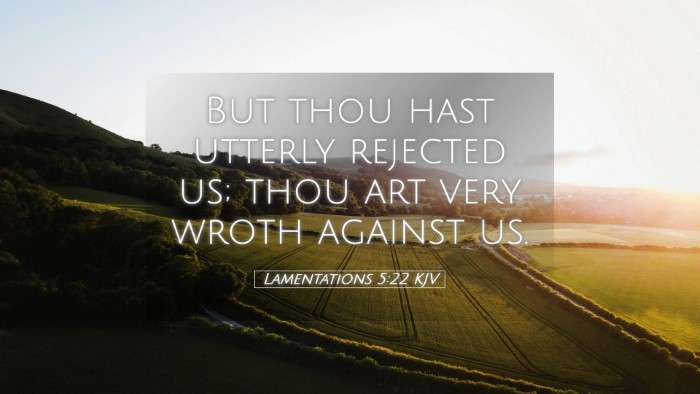Lamentations 5:22 Commentary
Bible Verse: "But thou hast utterly rejected us; thou art very wroth against us."
Introduction
The book of Lamentations is a profound expression of grief and mourning, reflecting on the destruction of Jerusalem and the resultant exile. Within this sorrowful tapestry, Lamentations 5:22 stands as a poignant plea to God amidst a backdrop of despair. This verse encapsulates the depth of human suffering and the apparent silence of God in the face of that suffering, which has intrigued and challenged theologians and scholars throughout the ages.
The Historical Context
Lamentations is traditionally attributed to the prophet Jeremiah, chronicling the catastrophic events surrounding the fall of Jerusalem in 586 B.C. The city was ravaged, the temple destroyed, and the people were forced into exile. This verse occurs in the final chapter of Lamentations, where the speaker's lament reaches its peak, revealing a community grappling with the harsh realities of divine judgment and desolation.
Exegetical Insights
The verse can be divided into two segments for deeper analysis:
- Divine Rejection: "But thou hast utterly rejected us;"
- Divine Anger: "thou art very wroth against us."
Divine Rejection
Matthew Henry comments on the profound implications of feeling utterly rejected by God, highlighting that it reflects the depths of the human condition in the face of divine judgment. He notes that this rejection is not merely a temporary stance but a profound sense of abandonment that plagues the heart of the afflicted. This sentiment resonates with any believer who has felt distanced from God during dark times.
Divine Anger
Albert Barnes elaborates on the aspect of God's wrath described in this verse. His commentary brings to light the seriousness of sin and its consequences. The anger of God is portrayed not as capricious but as a righteous response to the infidelity of His people. Barnes emphasizes that while God's anger is justified, it serves a purpose—calling the people back to repentance and restoration.
Theological Reflections
This verse raises significant theological questions about the nature of God and human suffering. One might wonder why a loving God allows His people to experience such rejection. Adam Clarke provides insight into the duality of divine love and divine discipline. He argues that God's rejection is ultimately a plea for repentance, emphasizing that divine wrath exists alongside divine mercy.
The Human Response to Divine Silence
In moments of great suffering, the perceived silence of God becomes almost unbearable. Scholars often reflect on this silence as a test of faith. In this context, Lamentations 5:22 invites believers to navigate their faith through doubt and despair. Matthew Henry posits that this moment can be transformative, leading individuals to seek God more earnestly even when He seems distant.
Public Ministry Implications
For pastors and leaders, this passage serves as a crucial reminder of the importance of addressing both the realities of sin and the hope of redemption. It challenges ministers to confront difficult topics such as divine judgment while simultaneously affirming God’s desire for reconciliation. The emotional gravity of Lamentations 5:22 can be utilized in pastoral care settings to help those who feel abandoned by God find solace and hope.
Conclusion
Lamentations 5:22 is a rich verse that encapsulates the struggles of a faith community grappling with the aftermath of divine judgment. By understanding the weight of divine rejection and the implications of divine wrath, believers can draw closer to God, recognizing it as an opportunity for reflection, repentance, and ultimately, restoration. The insights from historical commentaries highlight not only the plight of the Israelites but also the timeless relevance of this suffering in the life of the believer today.
Final Thoughts
The enduring message of Lamentations 5:22 remains pertinent across generations. As we reflect on this verse, let us remember that God is not distant; rather, He invites us into a deeper relationship through our trials, urging us towards repentance and renewal.


